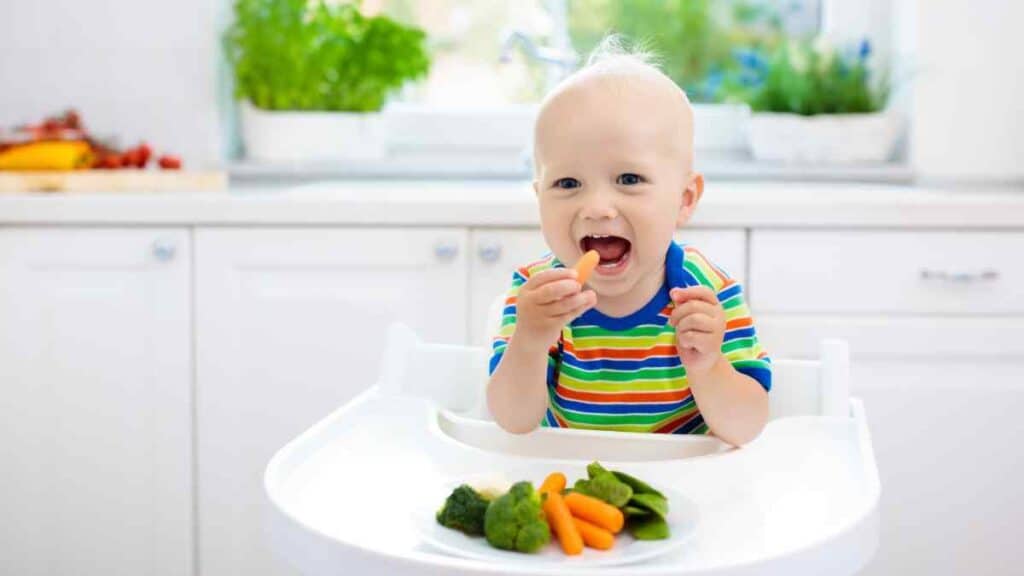Weaning baby onto solid foods marks a significant milestone in infant nutrition. It’s the perfect time to introduce other sources of nutrients besides breast milk or cow’s milk. But is the perfect time for your baby to begin eating solid foods?
If you’re one of the many new parents who are wondering about weaning baby, then you’re in for a treat. This content will discuss the basics of child weaning and everything that you need to learn about it. So, whether your child is into breast milk or formula, you’ll find certainly find vital information that will make the transition easier.

Is My Baby Ready to Eat Solid Foods?
Switching from breast milk or cow’s milk to finger foods is a monumental accomplishment for many parents and babies alike. But at the same time, it can also be daunting to some, especially who just had their first child. Here are a few signs that can help you tell if your weaning baby is ready to transition from breast milk or formula to finger foods:
Age
The American Academy of Pediatrics (AAP) advises parents and caregivers that babies are ready to add other sources of nutrition besides infant formula once they reach six months of age. Before this time, a toddler’s digestive system is still developing and won’t be capable of digesting solid foods like rice cereal.
Head Control
Another factor that you can consider is your baby’s head control. You need to make sure that your baby can hold his head properly to determine if they can start eating healthy foods. Doing so lets you know if your baby can push food without choking.
Interest in Foods
Your baby will start showing interest in starting solid foods at a particular time. Once you notice it, then you you may consider introducing solid foods that aren’t choking hazards to your baby. You may start to give your baby foods with unique textures to capture their interest.
Chewing Ability
Before your baby can even switch from cow’s milk to rice cereal, it’s important for them develop the capacity to chew. It means that they need to have the ability to move foods around their mouth using their tongue and swallow it without the food barring their air passage.
Food Allergies
You should also determine if your baby has any food allergy to particular foods. Remember that some babies have allergies to certain foods. So, it’s best to ask your child’s doctor to learn more about the potentially allergenic foods that might cause adverse effects to your child.
Weight
Lastly, your toddler’s weight is another indicator to let you know if your baby is ready to move past formula feeding or breast feeding and move into solid foods. Notice if your baby has doubled their birth weight. If they did, then you may want to consider starting solid foods.
How to Introduce Solid Foods Into Your Baby’s Diet
Knowing when to start solid foods can be a thrilling time for everyone in the family, especially your babies. That’s why it’s important to find ways to do it safely so that your baby can gradually shift from solely consuming cow’s milk to a more balanced diet. Here are a few ways to help you introduce new food to your baby.
Begin with Purees with Only One Ingredient
When introducing a new food, it’s best to start with one ingredient first such as green beans or even fruit chunks. Doing so will help you identify which are highly allergenic foods or which ones are not. Then, you can gradually start introducing foods with more than one ingredient afterward.
Offer Only Small Amounts
Besides offering cow’s milk formula, you can also include a small amount of puree for your baby. You can serve them on a soft-tipped spoon or even your clean finger. Initially, your baby may only take a few spoonfuls of baby food, so don’t worry if they don’t eat much puree made of raw vegetables.
Learn How to Read Baby Cues
Watch your baby for signs that they’re full or uninterested in the food. If your baby turns their head away or closes their mouth, it may be full or not ready for more food.
Introduce Different Food Textures
As your baby gets used to cow’s milk formula, you may soon start to consider introducing new food textures into their diet. You can gradually increase the texture by adding small pieces of soft food or mashing the food less. Doing so will help your baby develop their chewing and swallowing skills.
Avoid Giving Foods That May Choke Them
To prevent choking, avoid offering your baby hard, small, round, or sticky foods. Cut foods into small, soft pieces and supervise your baby when eating solids.
Continue Breastfeeding or Infant Formula Feeding
Even when your baby starts eating solid foods, breast milk or formula should still be the primary source of nutrition for the first year of life. Offer breast milk or formula before offering solid foods.
Remain Patient
Keep in mind that introducing solid foods is a gradual process, and it may take some time for your baby to get used to new foods and textures. Don’t force your baby to eat, and always follow their cues.
When is Baby Ready to Completely Stop Drinking Formula?

The American Academy of Pediatrics says that your baby’s nutritional needs will soon start to change as your baby age. That’s why it’s crucial to know the time babies typically stop relying on cow’s milk and switch to finger foods as an additional source of nutrition. Here are a few signs that your weaning baby is ready to switch to baby food.
Rightful Age
Most babies are ready to stop drinking formula between 9 and 12 months of age. However, every baby is different, and some may be ready to transition earlier or later.
Eating Solid Foods
Healthy babies may need less formula as they start to eat more solids. Once your baby eats a variety of solid foods and gets a balanced diet, they may no longer need formula.
Drinking Cow’s Milk
After your baby turns one year old, it can start drinking cow’s milk as a source of calcium and other essential nutrients. However, it’s important to note that cow’s milk should not replace breast milk or formula as the primary source of nutrition before one year of age.
Interest in Table Food
As you bring your babies into your family meals, they’ll start showing signs of interest in table food and begins to feed themselves, they may be ready to stop drinking formula. This can be a sign that your baby is ready for a more varied and textured diet.
Weight
Your baby’s weight can indicate whether they are ready to stop the formula. If your baby is gaining weight at a healthy rate and meeting their developmental milestones, it may be ready to make the transition.
What are the Signs of an Allergic Reaction?
As you consider transitioning your weaning baby from formula to other sources of nutrition, you must be aware of the signs of an allergic reaction to prevent food allergies. Various foods can cause allergic reactions, and it’s vital to recognize the symptoms so you can take action quickly. Here are some signs of an allergic reaction:
Skin Reactions
A food allergy can cause various skin reactions, such as hives, rashes, or eczema. These reactions can be itchy, red, and uncomfortable.
Respiratory Symptoms
Allergic reactions can also cause respiratory symptoms, such as wheezing, coughing, or difficulty breathing. These symptoms can be serious and require immediate medical attention.
Digestive Symptoms
Allergic reactions can cause digestive symptoms, such as nausea, vomiting, or diarrhea. These symptoms can be uncomfortable and can also lead to dehydration.
Swelling
Allergic reactions can cause swelling of the face, lips, tongue, or throat. This swelling can be serious and require immediate medical attention.
If your baby experiences any of these symptoms after eating new food, seeking medical attention immediately is essential. Your pediatrician can help you determine whether your baby is experiencing an allergic reaction and what steps you should take.
When transitioning your baby from formula to other sources of nutrition, it’s crucial to introduce new foods gradually and watch for any signs of an allergic reaction. For instance, if your baby is allergic to cow’s milk, you may need to look for other sources of calcium and other essential nutrients.
What Solid Foods Should I Avoid Giving My Baby?

When introducing solid foods to your weaning baby, it’s important to not only be aware of foods that can be harmful but also to be able to recognize the signs of an allergic reaction. Here are some solid foods you should avoid giving your baby, as well as a reminder of the signs of an allergic reaction:
Honey
Honey can contain spores of bacteria that can cause infant botulism, a rare but serious form of food poisoning. Avoid giving honey to babies under 1 year of age.
Choking Hazards
To prevent choking, avoid offering your baby foods that are hard, small, round, or sticky. Examples include nuts, popcorn, whole grapes, hot dogs, and chunks of meat.
Cow’s Milk
Do not give cow’s milk to babies under 1 year old, as it lacks the proper nutrient balance for their growth and may lead to digestive problems.
Salt and Sugar
Avoid adding salt or sugar to your baby’s food. Babies do not need added salt or sugar in their diet, and too much can be harmful.
Certain Seafood
Some types of seafood can contain high levels of mercury, which can be harmful to a baby’s developing brain. Avoid giving your baby shark, swordfish, king mackerel, and tilefish.
Raw or Undercooked Foods
Raw or undercooked meat, fish, or eggs can contain harmful bacteria that can cause food poisoning. Make sure all foods are cooked thoroughly before giving them to your baby.
Certain Vegetables
Vegetables such as spinach, beets, and collard greens can contain high levels of nitrates, which can be harmful to a baby’s health. Avoid giving your baby large amounts of these vegetables.
If your baby experiences any signs of an allergic reaction, such as skin reactions, respiratory symptoms, digestive symptoms, or swelling, seek medical attention immediately. It’s important to introduce new foods gradually and watch for any signs of an allergic reaction.
Conclusion
Transitioning from formula to solid foods can be exciting but sometimes daunting for babies and parents. By following the guidance of pediatricians and introducing new foods gradually, parents can help ensure their baby has a safe and healthy introduction to solid foods.
It’s essential to be aware of foods that can pose a choking hazard or harm a baby’s health and recognize the signs of an allergic reaction. Parents should also pay attention to their baby’s cues and progress and consult their pediatrician if they have any concerns.
Weaning your baby is a necessary process that requires patience and care. By taking the time to introduce new foods gradually and watch for any signs of an allergic reaction, parents can ensure a smooth transition for their baby to a varied and nutritious diet. Remember, every baby is different, and you should transition from formula to solid foods at a pace that suits the individual baby’s needs.
If you have a question, please leave a comment below. Don’t hesitate to leave a comment below.



